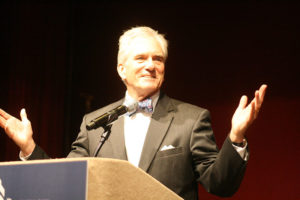A Baptist expert on religious liberty termed a ballot initiative repealing Oklahoma’s prohibition against using state funds for religious purposes “a dangerous road” toward the intermingling of church and state.
Brent Walker, executive director of the Baptist Joint Committee for Religious Liberty, recently told The Oklahoman that State Question 790, billed by supporters as an effort to protect religious liberty, could actually harm churches and religious organizations.

Brent Walker
“There are already a lot of protections that churches and religious organizations enjoy that I think would be threatened if this were to pass,” Walker, head of the Washington-based advocacy group representing 15 Baptist bodies in the United States, told the newspaper.
The ballot item up for vote Nov. 8, authored in the Oklahoma House of Representatives by Rep. John Paul Jordan (R-Yukon), is in response to a ruling that led to the removal of a Ten Commandments monument from state Capitol grounds in 2015.
“Since the Oklahoma Supreme Court’s decision in June regarding the Ten Commandments monument, my constituents wanted to know what could be done,” Jordan said in introducing the measure in April. “I knew it would be a difficult proposition to undo the ruling, so we looked at giving voters the opportunity to remove the basis for the ruling.”
If it passes, the resolution would strike an article in the Oklahoma constitution that states: “No public money or property shall ever be appropriated, applied, donated, or used, directly or indirectly, for the use, benefit, or support of any sect, church, denomination, or system of religion, or for the use, benefit, or support of any priest, preacher, minister, or other religious teacher or dignitary, or sectarian institution as such.”
Jordan, an attorney and member of Trinity Baptist Church in Yukon, Okla., said the court’s interpretation of the “no-aid” clause — one of several state laws passed in the 19th century preventing the use of taxpayer funds raised for public education to support parochial schools — could “potentially make our state hostile to religion.”
Walker, an attorney and ordained Baptist minister with more than 25 years specializing in church-state issues, said churches and religious organizations are currently exempt from certain discrimination and civil rights laws, but that could change if they start qualifying for taxpayer funds.
“The labor laws of Oklahoma tell privately owned businesses that they cannot discriminate against religion, except for churches,” Walker told The Oklahoman. “If we begin to receive funding, there is a possibility we would face lawsuits. It’s a really dangerous road we would be headed down.”
Mitch Randall, pastor of NorthHaven Church in Norman, Okla., and co-chair of the BJC-member Religious Liberty Council, argued against SQ 790 on theological, historical, legal and practical grounds in a series of blogs Sept. 19-22.
Previous stories:
Lawmakers seek repeal of no aid to religion in Oklahoma constitution
Oklahoma Supreme Court orders removal of Ten Commandments from Capitol lawn
